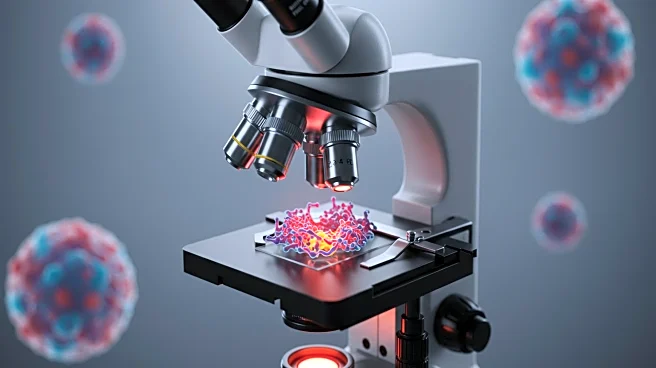What's Happening?
Brainstorm Cell Therapeutics Inc., a biotechnology company specializing in cellular therapies for neurodegenerative diseases, has published its Form 10-Q report for the second quarter of 2025. The report details the company's financial performance, including a net loss of $5.767 million for the first half of 2025, a slight improvement from the $5.942 million loss in the same period of 2024. The report also highlights the completion of Phase 3 ALS and Phase 2 PMS clinical trials for its NurOwn® cell therapy platform. Despite a refusal to file letter from the FDA regarding its Biologics License Application for NurOwn® in ALS treatment, Brainstorm is pursuing a Special Protocol Assessment for a Phase 3b trial. The company has optimized its manufacturing capabilities and expanded access to NurOwn® through an Expanded Access Program, allowing ALS patients additional doses post-trial.
Why It's Important?
The developments reported by Brainstorm Cell Therapeutics are significant for the biotechnology sector, particularly in the field of neurodegenerative disease treatment. The company's efforts to advance its NurOwn® platform could potentially lead to new therapeutic options for ALS and PMS patients, addressing unmet medical needs. The financial losses indicate challenges in the biotech industry, where high research and development costs often precede profitability. The ongoing regulatory discussions with the FDA are crucial, as approval could enhance Brainstorm's market position and provide a pathway for future treatments. The company's strategic partnerships and manufacturing optimizations are vital for scaling production and ensuring the availability of NurOwn® in international markets.
What's Next?
Brainstorm Cell Therapeutics is focused on obtaining regulatory approval for NurOwn® in ALS, with plans for a Phase 3b registrational trial. The company is also exploring clinical development for NurOwn® in PMS and Alzheimer's Disease, guided by recent scientific insights. The partnership with Minaris Advanced Therapies aims to bolster manufacturing capabilities for upcoming trials. Stakeholders, including investors and patients, will be closely monitoring the company's progress in regulatory engagements and clinical trial outcomes, which could significantly impact its future trajectory.
Beyond the Headlines
The refusal to file letter from the FDA underscores the regulatory hurdles faced by biotech companies in bringing new therapies to market. Brainstorm's commitment to advancing NurOwn® despite setbacks highlights the ethical responsibility to provide innovative treatments for debilitating conditions like ALS. The Expanded Access Program reflects a patient-centered approach, offering hope and extended care to trial participants. Long-term, successful regulatory approval and commercialization of NurOwn® could shift treatment paradigms in neurodegenerative diseases, influencing healthcare policies and research funding priorities.









